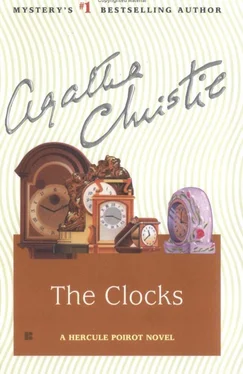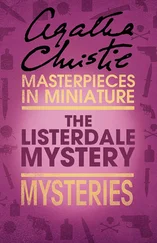Agatha Christie - The Clocks
Здесь есть возможность читать онлайн «Agatha Christie - The Clocks» весь текст электронной книги совершенно бесплатно (целиком полную версию без сокращений). В некоторых случаях можно слушать аудио, скачать через торрент в формате fb2 и присутствует краткое содержание. Год выпуска: 2004, ISBN: 2004, Издательство: Berkley, Жанр: Классический детектив, на английском языке. Описание произведения, (предисловие) а так же отзывы посетителей доступны на портале библиотеки ЛибКат.
- Название:The Clocks
- Автор:
- Издательство:Berkley
- Жанр:
- Год:2004
- ISBN:ISBN-13: 978-0425173916
- Рейтинг книги:5 / 5. Голосов: 1
-
Избранное:Добавить в избранное
- Отзывы:
-
Ваша оценка:
- 100
- 1
- 2
- 3
- 4
- 5
The Clocks: краткое содержание, описание и аннотация
Предлагаем к чтению аннотацию, описание, краткое содержание или предисловие (зависит от того, что написал сам автор книги «The Clocks»). Если вы не нашли необходимую информацию о книге — напишите в комментариях, мы постараемся отыскать её.
The Clocks — читать онлайн бесплатно полную книгу (весь текст) целиком
Ниже представлен текст книги, разбитый по страницам. Система сохранения места последней прочитанной страницы, позволяет с удобством читать онлайн бесплатно книгу «The Clocks», без необходимости каждый раз заново искать на чём Вы остановились. Поставьте закладку, и сможете в любой момент перейти на страницу, на которой закончили чтение.
Интервал:
Закладка:
‘Enter our young hero,’ I said.
‘You see,’ Poirot pointed out. ‘Even you cannot resist a farcical melodramatic tone when you speak of it. The whole thing is melodramatic, fantastic and completely unreal. It is the kind of thing that could occur in the writings of such people as Garry Gregson, for instance. I may mention that when my young friend arrived with this tale I was embarking on a course of thriller writers who had plied their craft over the last sixty years. Most interesting. One comes almost to regard actual crimes in the light of fiction. That is to say that if I observe that a dog has not barked when he should bark, I say to myself, “Ha! A Sherlock Holmes crime!” Similarly, if the corpse is found in a sealed room, naturally I say, “Ha! A Dickson Carr case!” Then there is my friend Mrs Oliver. If I were to find-but I will say no more. You catch my meaning? So here is the setting of a crime in such wildly improbable circumstances that one feels at once, “This book is not true to life. All this is quite unreal.” But alas, that will not do here, for this is real. It happened. That gives one to think furiously, does it not?’
Hardcastle would not have put it like that, but he fully agreed with the sentiment, and nodded vigorously. Poirot went on:
‘It is, as it were, the opposite of Chesterton’s, “Where would you hide a leaf? In a forest. Where would you hide a pebble? On a beach.” Here there is excess, fantasy, melodrama! When I say to myself in imitation of Chesterton, “Where does a middle-aged woman hide her fading beauty?” I do not reply, “Amongst other faded middle-aged faces.” Not at all. She hides it under make-up, under rouge and mascara, with handsome furs wrapped round her and with jewels round her neck and hanging in her ears. You follow me?’
‘Well-’ said the inspector, disguising the fact that he didn’t.
‘Because then, you see, people will look at the furs and the jewels and the coiffure and the haute couture, and they will not observe what the woman herself is like at all! So I say to myself-and I say to my friend Colin-Since this murder has so many fantastic trappings to distract one it must really be very simple. Did I not?’
‘You did,’ I said. ‘But I still don’t see how you can possibly be right.’
‘For that you must wait. So, then, we discard the trappings of the crime and we go to the essentials. A man has been killed. Why has he been killed? And who is he? The answer to the first question will obviously depend on the answer to the second. And until you get the right answer to these two questions you cannot possibly proceed. He could be a blackmailer, or a confidence trickster, or somebody’s husband whose existence was obnoxious or dangerous to his wife. He could be one of a dozen things. The more I heard, the more everybody seems to agree that he looked a perfectly ordinary, well-to-do, reputable elderly man. And suddenly I think to myself, “You say this should be a simple crime? Very well, make it so. Let this man be exactly what he seems -a well-to-do respectable elderly man.” ’ He looked at the inspector. ‘You see?’
‘Well-’ said the inspector again, and paused politely.
‘So here is someone, an ordinary, pleasant, elderly man whose removal is necessary to someone. To whom? And here at last we can narrow the field a little. There is local knowledge-of Miss Pebmarsh and her habits, of the Cavendish Secretarial Bureau, of a girl working there called Sheila Webb. And so I say to my friend Colin: “The neighbours. Converse with them. Find out about them. Their backgrounds. But above all, engage in conversation. Because in conversation you do not get merely the answers to questions-in ordinary conversational prattle things slip out. People are on their guard when the subject may be dangerous to them, but the moment ordinary talk ensues they relax, they succumb to the relief of speaking the truth, which is always very much easier than lying. And so they let slip one little fact which unbeknown to them makes all the difference.’
‘An admirable exposition,’ I said. ‘Unfortunately it didn’t happen in this case.’
‘But, mon cher, it did. One little sentence of inestimable importance.’
‘What?’ I demanded. ‘Who said it? When?’
‘In due course, mon cher.’
‘You were saying, M. Poirot?’ The inspector politely drew Poirot back to the subject.
‘If you draw a circle round Number 19, anybody within it might have killed Mr Curry. Mrs Hemming, the Blands, the McNaughtons, Miss Waterhouse. But more important still, there are those already positioned on the spot. Miss Pebmarsh who could have killed him before she went out at 1.35 or thereabouts and Miss Webb who could have arranged to meet him there, and killed him before rushing from the house and giving the alarm.’
‘Ah,’ said the inspector. ‘You’re coming down to brass tacks now.’
‘And of course,’ said Poirot, wheeling round, ‘you, my dear Colin. You were also on the spot. Looking for a high number where the low numbers were.’
‘Well, really,’ I said indignantly. ‘What will you say next?’
‘Me, I say anything!’ declared Poirot grandly.
‘And yet I am the person who comes and dumps the whole thing in your lap!’
‘Murderers are often conceited,’ Poirot pointed out. ‘And there too, it might have amused you-to have a joke like that at my expense.’
‘If you go on, you’ll convince me,’ I said.
I was beginning to feel uncomfortable.
Poirot turned back to Inspector Hardcastle.
‘Here, I say to myself, must be essentially a simple crime. The presence of irrelevant clocks, the advancing of time by an hour, the arrangements made so deliberately for the discovery of the body, all these must be set aside for the moment. They are, as is said in your immortal “Alice” like “shoes and ships and sealing wax and cabbages and kings”. The vital point is that an ordinary elderly man is dead and that somebody wanted him dead. If we knew who the dead man was, it would give us a pointer to his killer. If he was a well-known blackmailer then we must look for a man who could be blackmailed. If he was a detective, then we look for a man who has a criminal secret; if he is a man of wealth, then we look among his heirs. But if we do not know who the man is-then we have the more difficult task of hunting amongst those in the surrounding circle for a man who has a reason to kill.
‘Setting aside Miss Pebmarsh and Sheila Webb, who is there who might not be what they seem to be? The answer was disappointing. With the exception of Mr Ramsay who I understood was not what he seemed to be?’ Here Poirot looked inquiringly at me and I nodded, ‘everybody’s bona fides were genuine. Bland was a well-known local builder, McNaughton had had a Chair at Cambridge, Mrs Hemming was the widow of a local auctioneer, the Waterhouses were respectable residents of long standing. So we come back to Mr Curry. Where did he come from? What brought him to 19, Wilbraham Crescent? And here one very valuable remark was spoken by one of the neighbours, Mrs Hemming. When told that the dead man did not live at Number 19, she said, “Oh! I see. He just came there to be killed. How odd.” She had the gift, often possessed by those who are too occupied with their own thoughts to pay attention to what others are saying, to come to the heart of the problem. She summed up the whole crime. Mr Curry came to 19, Wilbraham Crescent to be killed. It was as simple as that!’
‘That remark of hers struck me at the time,’ I said.
Poirot took no notice of me.
‘ “Dilly, dilly, dilly-come and be killed.” Mr Curry came-and he was killed. But that was not all. It was important that he should not be identified. He had no wallet, no papers, the tailor’s marks were removed from his clothes. But that would not be enough. The printed card of Curry, Insurance Agent, was only a temporary measure. If the man’s identity was to be concealed permanently, he must be given a false identity. Sooner or later, I was sure, somebody would turn up, recognize him positively and that would be that. A brother, a sister, a wife. It was a wife. Mrs Rival-and the name alone might have aroused suspicion. There is a village in Somerset-I have stayed near there with friends-the village of Curry Rival-Subconsciously, without knowing why those two names suggested themselves, they were chosen. Mr Curry-Mrs Rival.
Читать дальшеИнтервал:
Закладка:
Похожие книги на «The Clocks»
Представляем Вашему вниманию похожие книги на «The Clocks» списком для выбора. Мы отобрали схожую по названию и смыслу литературу в надежде предоставить читателям больше вариантов отыскать новые, интересные, ещё непрочитанные произведения.
Обсуждение, отзывы о книге «The Clocks» и просто собственные мнения читателей. Оставьте ваши комментарии, напишите, что Вы думаете о произведении, его смысле или главных героях. Укажите что конкретно понравилось, а что нет, и почему Вы так считаете.












